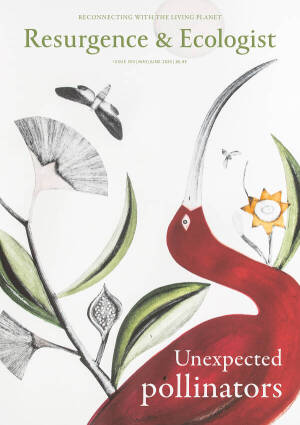I’ve been a fan of Vandana Shiva’s work for as long as I have been passionate about the environment, food and the connection between our mind, body and surroundings. It was during my late twenties that I first immersed myself in her work. In 2015, I was running a business selling organic food and chemical-free products, and Shiva’s name came up in many conversations – peers revered her for the environmental activist and scholar that she was. She was fighting against GMOs, and I was deeply inspired by all that she had to say about preserving seeds – the very essence of Nature. So when her latest work, The Nature of Nature, was announced, I sought it out like a thirsty traveller seeks out water in a desert. In these times of terrible news, I constantly look towards environmental experts for their wisdom and guidance.
In this book, Shiva highlights how large-scale industrial farming, genetic modification, and monoculture farming have devastated biodiversity, displaced farmers, and led to environmental degradation. She contrasts this with Indigenous and traditional farming practices, which she believes hold the key to restoring ecological balance and ensuring food sovereignty. She challenges the modern world’s exploitative relationship with Nature and urges us to reconnect. She critiques the reductionist view that treats Nature as a mere resource to be plundered and commodified, and instead advocates for a holistic approach that respects natural cycles and limits. Throughout the book, Shiva presents real-world examples and personal anecdotes that illustrate the consequences of industrialisation on agriculture and communities.
From the plight of small farmers to the destruction of forests for commercial gain, Shiva paints a vivid picture of the environmental challenges facing the world today. She goes on to write passionately about how humanity must shift from a system of exploitation to one of stewardship. She advocates for regenerative agriculture, biodiversity conservation, and the protection of Indigenous knowledge systems. According to her, these solutions are not just environmental, but also social and economic, ensuring long-term sustainability and resilience.
Throughout this deeply insightful book, Shiva calls upon the reader to rethink the dominant economic and agricultural models that prioritise corporate interests over environmental wellbeing. In fact, she calls on us as readers to question the rights of corporations and to take back what is rightfully ours. She explains elaborately why the richest 1% of this planet are to blame for Nature’s downfall. She guides people like me, who struggle to find ways to solve this problem at scale, to step in the direction of needle-moving change. She focuses on the word Big – putting Big Agriculture, Big Tech, Big Data, Big Food, Big Oil at the centre of the conversation, reminding us where to focus our attention.
Shiva writes with clarity and conviction, making her arguments easy to understand even for those new to environmental topics. She argues that Nature operates in a web of relationships where everything has a role to play – disrupting one element can have far-reaching consequences. This is a powerful and inspiring book that challenges the status quo and offers a hopeful vision for the future. It reminds us that by respecting and nurturing Nature, we can create a healthier, more just, and more sustainable world for generations to come. Shiva lays out a genuine and practical approach to the problems our world is facing. While it is not a light book to read, it serves as a wake-up call for individuals, policymakers and businesses to recognise the value of working with Nature rather than against it. I just hope it inspires more people to actually listen.
The Nature of Nature: The Metabolic Disorder of Climate Change by Vandana Shiva. Chelsea Green, 2024. ISBN: 9781645022879







